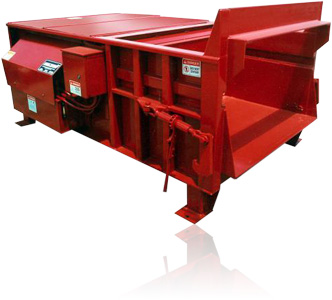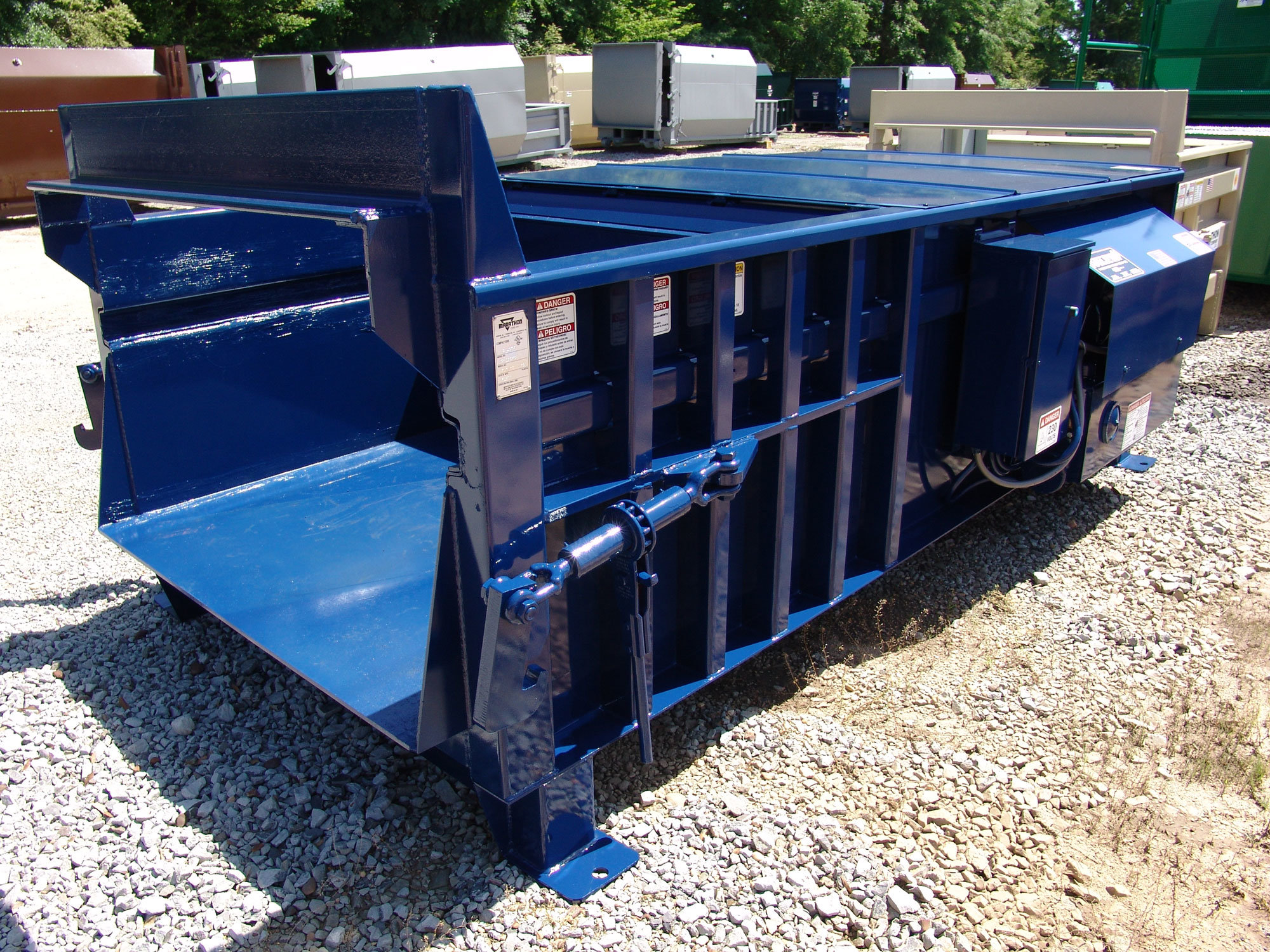The Function of Waste Equipment in Promoting Sustainable Garbage Disposal Practices
Waste Equipment offers a basic function ahead of time sustainable garbage disposal techniques. It encompasses a series of devices developed to improve the effectiveness of waste collection, partition, and processing. By utilizing Equipment such as compactors, shredders, and reusing bins, communities can significantly reduce their dependence on landfills. The effect of these tools prolongs past performance. Recognizing their broader effects reveals insights right into just how they shape ecological responsibility and area engagement. What exists ahead in this developing landscape?
Recognizing Waste Equipment and Its Significance
Waste Equipment plays a vital role in reliable waste administration systems. It incorporates a variety of devices and equipment created to handle, procedure, and deal with waste materials successfully. Understanding waste Equipment is very important for towns, companies, and organizations aiming to execute lasting waste disposal methods - Commercial garbage compaction equipment. Appropriately operating waste Equipment not just simplifies the collection and transportation of waste but also reduces environmental impact by making sure that waste is handled properly
The value of waste Equipment prolongs to enhancing recycling efforts, lowering land fill use, and advertising resource healing. Equipment such as balers, shredders, and compactors facilitate the handling of waste, making it less complicated to separate recyclable materials from basic refuse. In addition, innovations in waste innovation add to the advancement of more eco-friendly options, consequently strengthening the commitment to sustainability. Overall, waste Equipment works as a foundation for effective waste management, cultivating a cleaner and healthier environment for future generations.
Kinds Of Waste Equipment for Effective Waste Monitoring
Efficient waste management counts on various kinds of Equipment developed to address particular disposal needs. Amongst these, compactors play an essential duty by lowering the volume of waste, making transport extra reliable. Shredders are crucial for damaging down big items, promoting much easier handling and disposal. Additionally, balers compress recyclable products right into workable bundles, optimizing storage and transportation.
Containers and containers are fundamental for collecting waste at the source, assuring proper partition and lessening contamination. For unsafe products, customized Equipment, such as drum crushers and watertight containers, is necessary to assure safety and conformity with policies.
Lastly, transport lorries furnished with hydraulic systems boost the efficiency of waste collection and disposal procedures. Each sort of waste Equipment contributes to a streamlined waste administration system, advertising sustainability and lowering environmental impact with reliable disposal practices.
The Role of Recycling Containers in Lasting Practices
Reusing containers play an important role in advertising lasting practices by assisting in reliable waste splitting up. By offering assigned containers for recyclable materials, they motivate individuals to embrace eco-friendly behaviors. This simple implementation substantially adds to reducing garbage dump waste and improving recycling rates.
Effective Waste Separation
Correct waste splitting up plays an essential role in promoting sustainable practices, and recycling bins offer as a substantial tool in this process. By clearly comparing recyclables, compostables, and general waste, these bins facilitate reliable sorting, decreasing contamination and taking full advantage of recycling efficiency. Their calculated placement in public and private rooms motivates individuals to join liable garbage disposal. The use of color-coded bins aids to streamline the separation procedure, making it user-friendly for users. This business method not only boosts reusing rates yet additionally raises recognition regarding the importance of waste monitoring. Basically, reusing bins are basic elements that support efficient waste separation, inevitably contributing to an extra sustainable environment and reducing the overall stress on landfills.
Urging Eco-Friendly Behavior
Individuals might be inclined to overlook their effect on the setting, the existence of reusing containers significantly affects environmentally friendly habits. These containers work as visual tips, motivating people to separate recyclables from basic waste. Their strategic placement in public areas advertises accessibility, making it much easier for people to adopt sustainable practices. Studies show that when recycling bins are offered, reusing prices increase considerably, showing a direct relationship in between infrastructure and behavior. In addition, vibrant signage on these bins informs customers about what materials can be recycled, decreasing contamination rates. By promoting a society of recycling, these containers not just promote proper waste administration yet additionally motivate a cumulative duty towards ecological stewardship, eventually adding to a much more sustainable future.
Composting Systems: Turning Waste Into Resources
Composting systems serve as an essential tool in transforming natural waste right into valuable resources, supplying various environmental benefits. Numerous kinds of composting Equipment satisfy different needs, making the procedure obtainable to both individuals and communities. Recognizing the composting procedure is necessary for optimizing its efficiency and promoting lasting waste monitoring methods.
Benefits of Composting Equipments
Lots of neighborhoods are increasingly identifying the many benefits of composting systems, which change go to this website natural waste into beneficial sources. These systems efficiently reduce land fill waste, therefore lowering greenhouse gas discharges and conserving natural deposits. By converting food scraps, backyard waste, and other natural products right into nutrient-rich compost, they boost dirt health and wellness and fertility, advertising sustainable farming methods. Composting assists to retain wetness in the dirt, decreasing the need for chemical fertilizers and watering. It cultivates biodiversity by providing an environment for useful microorganisms and bugs. Additionally, composting informs people regarding ecological stewardship, encouraging a society of sustainability. Overall, composting systems play a necessary role in producing a round economic situation, where waste is minimized, and resources are recycled.
Sorts Of Composting Equipment
A selection of composting Equipment is available to help with the reliable handling of organic waste into useful compost. These systems vary from straightforward backyard compost bins to sophisticated business composters. For home usage, tumblers and static containers are popular, enabling convenient oygenation and blending. Oxygenated fixed heaps utilize blowers to enhance airflow, considerably quickening disintegration. Large procedures might employ in-vessel composters, which manage temperature level and moisture for optimal composting problems. Worm composters, or vermicomposting systems, harness the all-natural digestive processes of worms to break down raw material. Additionally, shredders and chippers assist prepare products by lowering dimension, advertising faster failure. Each kind of Equipment serves specific needs, enabling varied composting techniques that add to lasting waste monitoring.
Composting Refine Explained
The composting process transforms organic waste into nutrient-rich sources with a collection of chemical and organic responses. Microorganisms such as bacteria and fungi break down organic products, including food scraps and yard waste. This decomposition creates warmth, assisting in additional microbial activity and increasing the malfunction process. As the garden compost develops, the temperature decreases, permitting helpful organisms to thrive. The visibility of oxygen is necessary, promoting cardio problems that enhance microbial effectiveness. Throughout this process, carbon-to-nitrogen proportions need to be maintained to maximize decay. The end outcome is humus, a dark, crumbly material rich in nutrients, which can be made use of to enrich dirt, support plant development, and add to sustainable agricultural methods.
Innovative Technologies in Waste Collection and Disposal
As cities face enhancing waste quantities and environmental worries, innovative innovations in waste collection and disposal become crucial services. Smart waste containers geared up with sensing units track fill levels, enhancing collection routes and minimizing gas consumption. These bins can likewise connect with waste management systems, minimizing and helping with prompt pick-ups overflow issues. Additionally, autonomous cars, consisting of drones and robot systems, are being deployed to boost operational effectiveness in waste collection.
Advancements in sorting technologies, such as man-made knowledge and device discovering, make it possible for more effective recycling processes by quickly determining and dividing products. Waste-to-energy technologies convert organic waste into renewable energy, decreasing garbage dump reliance and contributing to energy sustainability. These developments not only improve waste management practices but also advertise a round see this page economy, thus promoting a sustainable approach to garbage disposal. Inevitably, the combination of these innovations plays a pivotal duty in attending to metropolitan waste challenges and enhancing ecological stewardship.
Neighborhood Engagement Through Waste Equipment
While reliable waste administration relies heavily on innovative innovations, community engagement with waste Equipment plays a crucial function in fostering sustainable practices (Commercial garbage compaction equipment). Waste Equipment, such as reusing bins and composting stations, offers not just as functional devices however also as catalysts for area understanding and participation. By positioning these sources in available locations, districts motivate people to take an active duty in waste reduction and reusing efforts
Educational projects going along with waste Equipment installations can additionally enhance neighborhood participation, directing locals on correct disposal methods and the advantages of lasting methods. Additionally, neighborhood events that use waste Equipment, such as clean-up drives and recycling difficulties, inspire cumulative action and build a feeling of obligation amongst community participants.

The Future of Waste Management and Lasting Solutions
Technologies in modern technology and changes in societal attitudes are forming the future of waste administration and lasting options. Smart waste monitoring systems, using IoT gadgets, are enabling real-time surveillance of waste degrees, optimizing collection courses, and minimizing carbon footprints. These advancements not just enhance performance yet also advertise reusing and composting campaigns by offering data-driven understandings.
The increase of circular economic situation methods urges business to reassess product layout, focusing on reusability and recyclability. This change fosters a society of sustainability, where customers are progressively requiring green products.
Community involvement in waste administration is ending up being significantly important, with academic programs encouraging people to take duty for their waste. As governments worldwide execute stricter regulations on waste disposal, areas and companies are triggered to take on lasting techniques. Together, these aspects lead the means for a future where waste is decreased, and sources are saved, making certain a much healthier planet.
Often Asked Concerns

Just How Can Organizations Benefit Financially From Spending in Waste Equipment?
Buying waste Equipment can lead to considerable financial advantages for companies. By boosting effectiveness, reducing disposal costs, and improving reusing capacities, companies can reduce functional expenses and possibly create income via recovered materials.
What Rules Govern making use of Waste Equipment in Different Areas?
Numerous regulations regulate waste Equipment usage, differing by area. These include environmental requirements, safety procedures, and operational guidelines, targeted at making certain compliance, promoting public health and wellness, and minimizing ecological influence linked with waste monitoring other methods.
Just how Do I Choose the Right Waste Equipment for My Needs?
Choosing the proper waste Equipment necessitates assessing particular waste kinds, volume, and disposal methods. Investigating readily available options, seeking advice from specialists, and thinking about regulative conformity will help in making an educated decision tailored to private demands.
What Are the Ecological Influences of Ineffective Waste Equipment?
Inefficient waste Equipment can lead to enhanced exhausts, higher power intake, and better land fill overflow. It frequently results in improper waste partition, aggravating air pollution and adversely influencing ecological communities, which inevitably impedes lasting waste monitoring initiatives.
Just How Can Waste Equipment Be Kept for Optimum Efficiency?
Waste Equipment can be preserved for peak efficiency with routine assessments, timely repair work, appropriate cleaning, and adherence to manufacturer guidelines. This guarantees performance, expands Equipment life-span, and decreases ecological effect during waste management processes.
Waste Equipment plays an essential duty in reliable waste monitoring systems. Recognizing waste Equipment is essential for organizations, organizations, and towns intending to implement lasting waste disposal practices. While efficient waste monitoring relies heavily on innovative innovations, community involvement through waste Equipment plays a crucial function in fostering lasting methods. Area involvement in waste monitoring is ending up being increasingly necessary, with educational programs encouraging individuals to take obligation for their waste. Selecting the proper waste Equipment demands examining certain waste kinds, quantity, and disposal techniques.